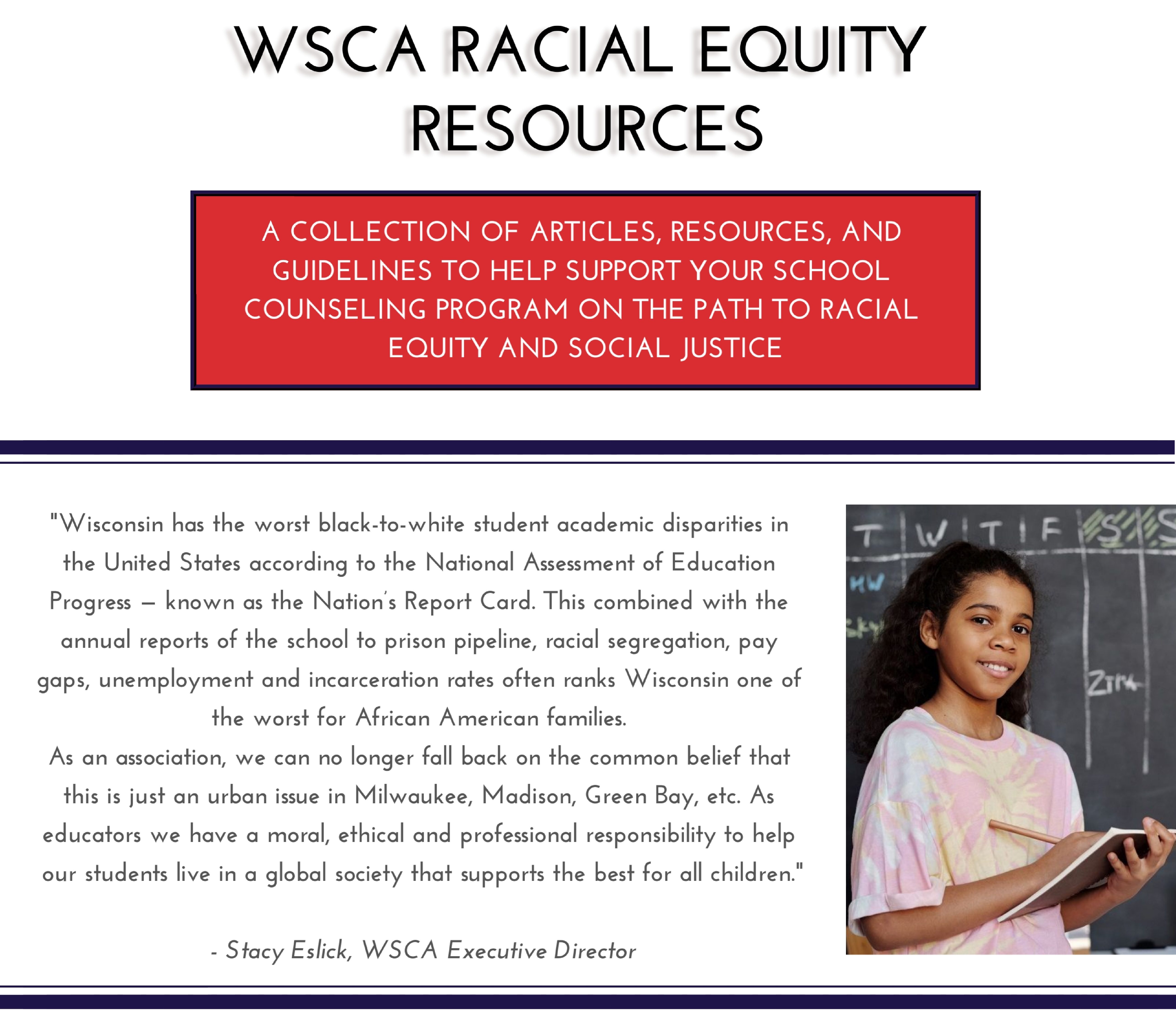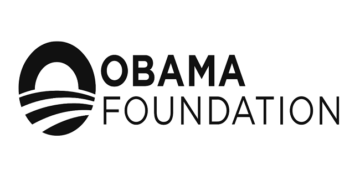
Jump to Section:
- Professional & Personal Growth Focused on Racism and Equity
- WSCA’s Recommended Reading List – For Adults
- WSCA’s Recommended Reading List – For Children
- Advocacy Action Steps
- Resources for Educators
- Resources for Families
- Resources Specific to Wisconsin
Professional & Personal Growth Focused on Racism and Equity
The leadership of WSCA wears the burden during times of crisis and peace alike the need to be your source for accurate, ethical, and supportive positions and materials. With this in mind, we will be working on creating a number of tools for you to use, as well as promoting access to outside resources for you to use one your journey towards understanding and promoting racial equity and social justice.
This Is Not A Fire Drill: Derek Francis Shares His Playbook For Supporting Students After George Floyd’s Murder
by Derek Francis, Manager of Counseling Services for Minneapolis Public Schools

Knowing how to support students right now is extremely difficult. I know this, and I acknowledge the seemingly insurmountable challenges before us, and I challenge you still. Some of us are worried we’ll say the wrong thing or worried that it’s not our place to take the lead. We have to set those fears aside, and trust that our compassion and our desire to listen and learn will pave the way for fruitful discussions and healing. This is our chance to be proactive as school counselors. My hope is that we can create space for all students who are hurting and trying to navigate the recent events. I hope these strategies can help.
Supporting Students After a Racial Event
By Derek Francis, Manager of Counseling Services for Minneapolis Public Schools
The death of George Floyd is triggering for many students. Schools counselors we cannot sit silent. We must provide social emotional support. This impacts all students, not just inner city. 94% of Minneapolis Police do not live in Minneapolis so this work has to be done in schools and communities outside of MPLS. Below is a video as a starting point to begin doing this work. In Minneapolis Schools we are using these strategies to support our student who are hurting. Don’t wait for the students to bring this up. The hashtags and Facebook post aren’t enough. Have conversations with your students and colleagues.
Lack of responding to these issues further increase the opportunity and achievement gap. If navigating these conversations is hard or uncomfortable/conflicting for you I encourage you to seek training and professional development from your building or WSCA. This is the chance to stop saying you want equity and actually do the equity work. Here is a resource document to accompany the video.
Transforming Our Public Schools: Culturally Responsive-Sustaining Education
Created by the NYC Culturally Responsive Education Working Group and the Education Justice Research and Organizing Collaborative (EJ-ROC) at the NYU Metro Center
Culturally Responsive-Sustaining (CR-S) Education draws on decades of research in asset-based pedagogies that recognize that cultural difference (including racial, ethnic, linguistic, gender, sexuality and ability) should be treated as assets for teaching and learning. This approach to education counters dominant narratives about difference as deficit or as characteristics of students and families that should be remediated or assimilated. Using this approach to education, all families are believed to have cultural capital, or knowledge, abilities, and networks, that can, and should, be leveraged in classrooms. While schooling has traditionally privileged the capital of families from dominant backgrounds, CR-S positions educators to acknowledge, value, and leverage the wealth of knowledge found in communities that have been marginalized.
The button below will bring you to the Culturally Responsive-Sustaining Education Framework, but please also reference this guide as an introduction to the concept as a whole, and visit the culturally responsive hub online to find more information.
Stop Asking People Of Color To Explain Racism–Pick Up One Of These Books Instead
by Rachel Garlinghouse of Scary Mommy Book Club
There are some incredible books available to teach us about race, race relations, history, and progress. For those who actually want to learn, to get woke, and to stay educated, these books are downright essential and helpful. Many of us are parents, and if we’re going to change the tide for future generations, we have to tackle race head-on instead of evading it or pretending we are, as many white people have told me, all-one-race-the-human-race.
Resources for Talking About Race, Racism, and Radicalized Violence with Kids
by The Center for Racial Justice
This document was compiled by Center for Racial Justice in Education. It is not meant to be exhaustive and will be continually updated as we are made aware of more resources. It includes sections highlighting: Interviews/Advice from Experts, Resource Lists, Articles, The 2016 Election, Examples, and Affinity Spaces.
George Floyd, Racism and Law Enforcement
by The Anti-Defamation League
On May 25, 2020, George Floyd, an African American man, died while being arrested by the police. A bystander video recording of the incident showed that a white police officer pinned Floyd to the ground while he was handcuffed. The police officer’s knee pressed into the back of Floyd’s neck for more than eight minutes, even after Floyd lost consciousness. On the video, Floyd was heard saying, “Please, I can’t breathe. My stomach hurts. My neck hurts. Everything hurts. … (I need) water or something. Please. Please. I can’t breathe, officer. … I cannot breathe. I cannot breathe.” In a statement, the Minneapolis Police Department said that officers had responded to a call about a man suspected of forgery.
The incident was shared widely on social media. This led to community and national outrage, an F.B.I. civil rights investigation and the firing of the officer, Derek Chauvin and three other officers who were also at the scene. On May 29, Chauvin was arrested and charged with third degree murder and manslaughter. Prosecutors said the investigation into the three other officers is ongoing. This article walks through the background of the situation, and also provides prompts for conversations to have with others while processing these events.
Anguish and Action
By The Obama Foundation
We work to help leaders change their world—and the world needs changing. The killings of George Floyd, Breonna Taylor, Ahmaud Arbery, and the loss of far too many Black lives to list, have left our nation anguished and outraged. While now is a time for grief and anger, it is also a time for resolve. Find resources below to learn what you can do to create a more just and equitable world.
Race, Gender, Class and Achievement: A Culturally Responsive Approach to Urban School Counseling
by Sejal Parikh Foxx, Rachel Saunders, Chance W. Lewis
Ladson-Billings called upon educators to practice culturally responsive teaching. This pedagogy is grounded in the principle that students’ cultural references ought to be infused in all areas of teaching and learning. The premise of this pedagogy is that it provides students from all cultures with equity and access to education. In The Dreamkeepers, Ladson-Billings defined culturally responsive [practitioners] as possessing eight pillars. Using these eight characteristics as a foundation, we outline specific strategies school counselors can incorporate into comprehensive school counseling programs. The aim is for urban school counselors to respond to issues of race, gender, and class that may prevent opportunity and access to academic achievement.
White Fragility: Why It’s So Hard to Talk to White People About Racism
by Dr. Robin DiAngelo
I am white. I have spent years studying what it means to be white in a society that proclaims race meaningless, yet is deeply divided by race. This is what I have learned: Any white person living in the United States will develop opinions about race simply by swimming in the water of our culture. But mainstream sources—schools, textbooks, media—don’t provide us with the multiple perspectives we need.
Yes, we will develop strong emotionally laden opinions, but they will not be informed opinions. Our socialization renders us racially illiterate. When you add a lack of humility to that illiteracy (because we don’t know what we don’t know), you get the break-down we so often see when trying to engage white people in meaningful conversations about race.
Recommended Reading List – Adults
Recommended Reading List – Children
Advocacy Action Steps
During these times, it can be hard to know what tangible steps can be taken to help bring about the systemic change we should all be working towards. Use some of these examples below once you have taken the time to work on your personal growth.
Sample script to send to local and state government officials and representatives:
“I’ve been doing a lot of work personally and professionally to learn more about the equity and systemic racism issues that face the Black community as well as other marginalized populations. If you need an ally in this work, I am happy to lend a hand.”
Find your legislator:
https://legis.wisconsin.gov/
*More steps will continue to be added as WSCA leaders do their own work and find more resources
Resources for Educators
Resources for Families
Resources Specific to Wisconsin
WSCA is providing free access to many of our publications, resource materials, and ongoing support to PreK-12 educators during this time of unrest. This is in an effort to provide counselor workforce advocacy, address Covid-19, and most recently to support awareness and education in regards to racial inequities and civil unrest. Though we do these things with an open heart and in an effort to share awareness and access to valuable resources, they do take time and money to implement. If you have found value in these efforts, please consider supporting WSCA with a membership (affiliate memberships available for those who are not practicing school counselors).


